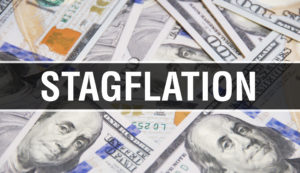Talk of stagflation is all the rage. Sort of. Most of the articles I read about the subject focus primarily, if not exclusively on inflation.
Where’s the ‘stag’ part? The word ‘stagflation’ is a handy portmanteau that came about in the 1970s when, for the first time in modern history, we experienced stagnant economic growth coupled with high and persistent inflation. Those two circumstances were thought to be mutually exclusive. In fact, they represent the worse of both worlds. Normally, if the economy is stagnant, there’s no inflation. Alternatively, if there’s inflation, it was always assumed that it was because the economy was overheating and growing too quickly.
In the second half of 2021, it seems everyone is piling on the stagflation narrative. Nouriel Roubini of NYU was talking about the circumstances being right for stagflation more than a year ago already, but it was only around the middle of 2021 that a narrative like his began to gain traction.
Lynchpin is Inflation
The lynchpin of the story is inflation. Everyone has a view on whether it is transitory or not, even as no one can really deny that we’ve already experienced more inflation for longer in the past 7 or 8 months than in any period in modern history. I’m more worried about stagnant growth, yet far fewer people seem inclined to openly share that concern.
The Government of Canada has conceded that economic growth over the past couple of months has been falling short of what it thought would happen. This is the case even though most jobs that were lost due to the Covid-induced recession have long since returned. The bigger problem is that we in the west will simply not be able to grow our economy the way we used to. Cheap oil is also dirty, so we’ll need to pivot, and that costs growth. Stimulus has ended, so that slows growth. Women have greatly reduced the number children they are having and have already maximized workforce participation, so the drivers of growth from past generations won’t be drivers anymore.
There are many reasons why we should expect economic growth to slow considerably – and possibly even for growth to stop altogether. My concern is that no one wants to acknowledge that. Politicians don’t: it’s bad for re-election. Financial advisors don’t: it’s bad for business.
Anyone whose career depends on Bullshift – telling optimistic stories about the future no matter how fictitious the premise – is going to have a hard time acknowledging the slow grow (no growth?) reality of our times.
Ignoring problems does nothing to make them go away, however. We’d all be well-served if we acknowledged that the growth we’ve enjoyed throughout our lives might never be seen again.
 John De Goey, CIM, CFP, FP Canada™ Fellow, is a Portfolio Manager with Toronto-based Wellington-Altus Private Wealth Inc. This blog originally appeared on the firm’s “Newswire” site on Nov 2, 2021 and is republished on the Hub with permission.
John De Goey, CIM, CFP, FP Canada™ Fellow, is a Portfolio Manager with Toronto-based Wellington-Altus Private Wealth Inc. This blog originally appeared on the firm’s “Newswire” site on Nov 2, 2021 and is republished on the Hub with permission.
The information contained herein has been provided for information purposes only. The information has been drawn from sources believed to be reliable. Graphs, charts and other numbers are used for illustrative purposes only and do not reflect future values or future performance of any investment. The information does not provide financial, legal, tax or investment advice. Particular investment, tax, or trading strategies should be evaluated relative to each individual’s objectives and risk tolerance. This does not constitute a recommendation or solicitation to buy or sell securities of any kind. Market conditions may change which may impact the information contained in this document. Wellington-Altus Private Wealth Inc. (WAPW) does not guarantee the accuracy or completeness of the information contained herein, nor does WAPW assume any liability for any loss that may result from the reliance by any person upon any such information or opinions. Before acting on any of the above, please contact me for individual financial advice based on your personal circumstances. WAPW is a member of the Canadian Investor Protection Fund and the Investment Industry Regulatory Organization of Canada.
Share this:
- Click to share on X (Opens in new window) X
- Click to share on LinkedIn (Opens in new window) LinkedIn
- Click to share on Facebook (Opens in new window) Facebook
- Click to share on Reddit (Opens in new window) Reddit
- Click to email a link to a friend (Opens in new window) Email
- Click to print (Opens in new window) Print


